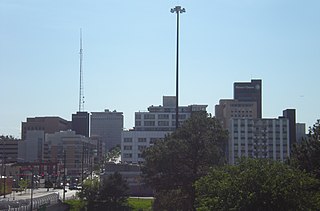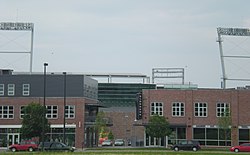
Saddle Creek Records is an American record label based in Omaha, Nebraska. Started as a college class project on entrepreneurship, the label was founded by Mike Mogis and Justin Oberst in 1993. Mogis soon turned over his role in the company to Robb Nansel. The label is named after Saddle Creek Road, a street that cuts through the east side of midtown Omaha, and the beginnings of a scene whose members included Justin's brother Conor Oberst, Tim Kasher, and others. Collectively, they were known unofficially as the "Creekers". Saddle Creek first appeared in print on a show flyer, offering to "Spend an evening with Saddle Creek" Saddle Creek became an incorporated entity as a result of a class project on entrepreneurship. Distribution is handled by Redeye Distribution.
The Music of Nebraska has included a variety of country, jazz, blues, ragtime, rock and alternative rock musicians. Several towns across the state have active musical venues, with several communities having a particularly important musical legacy.

Conor Mullen Oberst is an American singer-songwriter best known for his work in Bright Eyes. He has also played in several other bands, including Desaparecidos, The Faint, Commander Venus, Park Ave., Conor Oberst and the Mystic Valley Band, Monsters of Folk, and Better Oblivion Community Center. Oberst was named the Best Songwriter of 2008 by Rolling Stone magazine.

The Champaign–Urbana metropolitan area, also known as Champaign–Urbana and Urbana–Champaign as well as Chambana (colloquially), is a metropolitan area in east-central Illinois. It is the 191st largest metropolitan area in the U.S. It is composed of three counties, Champaign, Ford, and Piatt. The Office of Management and Budget has designated the three-county Champaign–Urbana area as one of its metropolitan statistical areas, which are used for statistical purposes by the Census Bureau and other agencies.
Commander Venus was an American Indie rock band from Omaha, Nebraska. Fronted by Conor Oberst and Tim Kasher, the band also included Todd Fink and Matt Bowen of The Faint, Ben Armstrong of Head of Femur and Robb Nansel, executive producer of the indie label Saddle Creek. Kasher subsequently went on to front the band Cursive, and Oberst later became famous as the core member of the indie folk collective Bright Eyes, and later the punk band Desaparecidos.

Johnny Rosenblatt Stadium was a baseball stadium in Omaha, Nebraska, the former home to the annual NCAA Division I College World Series and the minor league Omaha Royals, now known as the Omaha Storm Chasers. Rosenblatt Stadium was the largest minor league baseball stadium in the United States until its demolition.

Cursive is an American indie rock band from Omaha, Nebraska, on 15 Passenger Records, Saddle Creek Records, and Big Scary Monsters (UK). Stylistically described as emo and post-hardcore, Cursive came to prominence with 2000's Domestica and found commercial and critical success with 2003's The Ugly Organ. The band has released eight studio albums, a compilations album, and a mix of singles and EPs since 1997.

Timothy J. Kasher is a musician from Omaha, Nebraska, and is the frontman of indie rock groups Cursive and The Good Life, both of which are on the Omaha-based record label Saddle Creek Records.

Todd Fink is the lead singer of the band The Faint. He attended Omaha's Westside High School.
Slowdown Virginia was an indie rock band from Omaha, Nebraska. Formed in 1993, the band recorded and released one album, Dead Space, on Lumberjack Records in 1994, the predecessor to today's Saddle Creek Records. After playing an influential role in inspiring the later formation of other Omaha bands like Bright Eyes, The Faint, and Desaparecidos with their energetic live shows and recordings, Slowdown Virginia broke up in the spring of 1995. A month after breaking up, Kasher, Maginn, and Pedersen regrouped with a new drummer to form Cursive. Omaha's mixed entertainment venue Slowdown is named in honor of the band.
Robb Nansel is an Omaha musician and co-founder / president of Saddle Creek Records. He is also credited as a member of Commander Venus and Bright Eyes.
Steve Pedersen is an American guitarist from Omaha, Nebraska. He left Cursive in 1998 to attend law school at Duke University in North Carolina, after graduating from Creighton University with a degree in political science. At Duke, he started the band The White Octave, which released two albums and appeared on a few samplers. When Pedersen graduated, he returned to Omaha, started Criteria, and began working at Kutak Rock LLP.
The Cog Factory, formerly located at 2224 Leavenworth Street in Omaha, Nebraska, was a 501(c)(3) non-profit organization that provided a punk rock music performance space for the area. The facility opened in 1994 with bands Ritual Device, Sideshow and Mousetrap. Musician Conor Oberst began making public performances there in the 1990s. Cog Factory closed permanently in January 2002.

Film Streams is a nonprofit arts organization in Omaha, Nebraska that oversees two cinemas: the Ruth Sokolof Theater, in North Downtown Omaha, and the historic Dundee Theater, Omaha's longest surviving neighborhood cinema. It receives funding from corporate and individual donors, members, and the government.
Dead Space was the only album released by the Omaha, Nebraska based rock band Slowdown Virginia. Distributed by Lumberjack Records in 1994, copies of the album spread locally on compact disc. Slowdown Virginia broke up shortly after the release of the album, with three of the four members forming the band Cursive a month later.
Neva Dinova is an indie band from Omaha, Nebraska. The band is named after the grandmother of lead singer Jake Bellows. They were initially on crank! a record company, and recorded a collaborative album with Bright Eyes entitled One Jug of Wine, Two Vessels. In April 2008, the band released their first album from Saddle Creek Records entitled You May Already Be Dreaming. Drummer Roger Lewis is also the drummer for fellow Saddle Creek band The Good Life, with whom Bellows completed a solo tour in the fall of 2016. Bellows remained a key associate with Bright Eyes in 2006 and 2007 and contributed to the album Cassadaga.

The Jewell Building is a city landmark in North Omaha, Nebraska. Built in 1923, it is listed on the National Register of Historic Places. Located at 2221 North 24th Street, the building was home to the Dreamland Ballroom for more than 40 years, and featured performances by many touring jazz and blues legends, including Duke Ellington, Count Basie, Louis Armstrong, Dizzy Gillespie, and Lionel Hampton.

Midtown is a geographic area of Omaha, Nebraska that is a culturally, socially and economically important area of the city. It is home to major research centers, national corporations, several historic districts, and a number of historic residences.
Music in Omaha, Nebraska, has been a diverse and important influence in the culture of the city. Long a home to jazz, blues, funk and rock, today Omaha has dozens of subgenres represented, including Latin, alternative rock and hip hop. Omaha's historical music contributions include being the home of a thriving African American music scene from the 1920s. More recently, it is home to indie rock's "Omaha Sound" and the birthplace of one of pop music's most successful producers, Terry Lewis.

Downtown Omaha is the central business, government and social core of the Omaha-Council Bluffs metropolitan area, U.S. state of Nebraska. The boundaries are Omaha's 20th Street on the west to the Missouri River on the east and the centerline of Leavenworth Street on the south to the centerline of Chicago Street on the north, also including the CHI Health Center Omaha. Downtown sits on the Missouri River, with commanding views from the tallest skyscrapers.













